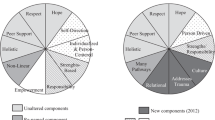Abstract
In this essay, I analyze two memoirs—Rafael Campo's The Poetry of Healing: A Doctor's Education in Empathy, Identity, and Desire and Abraham Verghese's My Own Country: A Doctor's Story of a Town and Its People in the Age of AIDS—which describe the effects of treating HIV/AIDS on each doctor's identity, on his desire for community and belonging, and on his identification and/or disidentification with the medical profession in the United States. My readings of Campo and Verghese revolve around three key terms provided by Campo's subtitle: identity, empathy, and desire. I shift the order of these terms in Campo's subtitle because I want to read identity, empathy, and desire in Campo and Verghese through and along with the theoretical “pragmatics” of Gilles Deleuze and Felix Guattari.
Similar content being viewed by others
References
R. Braidotti, Nomadic Subjects: Embodiment and Sexual Difference in Contemporary Feminist Theory (New York: Columbia University Press, 1994).
R. Campo, The Poetry of Healing: A Doctor's Education in Empathy, Identity, and Desire (New York and London: Norton, 1997).
G. Deleuze, and F. Guattari, Anti-Oedipus: Capitalism and Schizophrenia. Trans. R. Hurley, et al. (Minneapolis and London: University of Minnesota Press, 1983).
G. Deleuze, and F. Guattari, Nomadology: The War Machine (New York: Semiotexte, 1986).
G. Deleue, and F. A. Guattari, Thousand Plateaus: Capitalism and Schizophrenia, trans. B. Massumi (Minneapolis and London: University of Minnesota Press, 1987).
J. Epstein, Altered Conditions: Disease, Medicine, and Storytelling (New York and London: Routledge, 1995).
G. Fisher, Gary in Your Pocket: Stories and Notebooks of Gary Fisher, (ed.) E. K. Sedgwick (Durham and London: Duke University Press, 1996).
A. W. Frank, The Renewal of Generosity: Illness, Medicine, and How to Live Chicago and London: University of Chicago Press, 2004).
S. Freud, The Interpretation of Dreams. 1900, Trans. and ed. J. Strachey (New York: Avon Books, 1965).
R. Garland-Thomson, (ed.) Freakery Cultural Spectacles of the Extraordinary Body: (New York: New York University Press, 1996).
E. Grosz, “Becoming ... An Introduction.” In Becomings: Explorations in Time, Memory, and Futures, (ed.) E. Grosz (Ithaca and London: Cornell University Press, 1999): 1–11.
D. Haraway, Simians, Cyborgs, and Women: The Reinvention of Nature (New York: Routledge, 1991).
A. Kleinman, The Illness Narratives: Suffering, Healing, and the Human Condition (New York: Basic Books, 1988).
A. Lorde, Sister Outsider: Essays and Speeches (Trumansburg, New York: Crossing Press, 1984).
B. Massumi, Translator's Forward: Pleasures of Philosophy, In A Thousand Plateaus: Capitalism and Schizophrenia, (eds.) G. Deleuze and F. Guattari (Minneapolis and London: University of Minnesota Press, 1987): ix–xix.
T. F. Murphy, and S. Poirier, (eds.) Writing AIDS: Gay Literature, Language, and Analysis (New York: Columbia University Press, 1993).
E. Probyn, Outside Belongings (New York and London: Routledge, 1996).
O. Sacks, A Leg to Stand On (New York: HarperCollins, 1993).
K. Scannell, Death of the Good Doctor: Lessons from the Heart of the AIDS Epidemic (San Francisco: Cleis, 1999).
P. A. Selwyn, Surviving the Fall: The Personal Journey of an AIDS Doctor (New Haven: Yale University Press, 2000).
E. Spelman, Fruits of Sorrow: Framing Our Attention to Suffering (Boston: Beacon Press, 1997).
G. C. Spivak, “Can the Subaltern Speak?” In P. Williams and L. Chrisman, (eds.) Colonial Discourse and Post-Colonial Theory: A Reader (New York: Columbia University Press, 1994): 66–111.
A. Verghese, My Own Country: A Doctor's Story of a Town and Its People in the Age of AIDS (New York: Simon and Schuster, 1994).
A. Verghese, The Tennis Partner: A Doctor's Story of Friendship and Loss (New York: HarperCollins, 1998).
A. Zuger, Strong Shadows: Scenes from an Inner City AIDS Clinic (New York: W. H. Freeman, 1995).
Author information
Authors and Affiliations
Corresponding author
Rights and permissions
About this article
Cite this article
Diedrich, L. AIDS and Its Treatments: Two Doctors' Narratives of Healing, Desire, and Belonging. J Med Humanit 26, 237–257 (2005). https://doi.org/10.1007/s10912-005-7699-9
Issue Date:
DOI: https://doi.org/10.1007/s10912-005-7699-9




